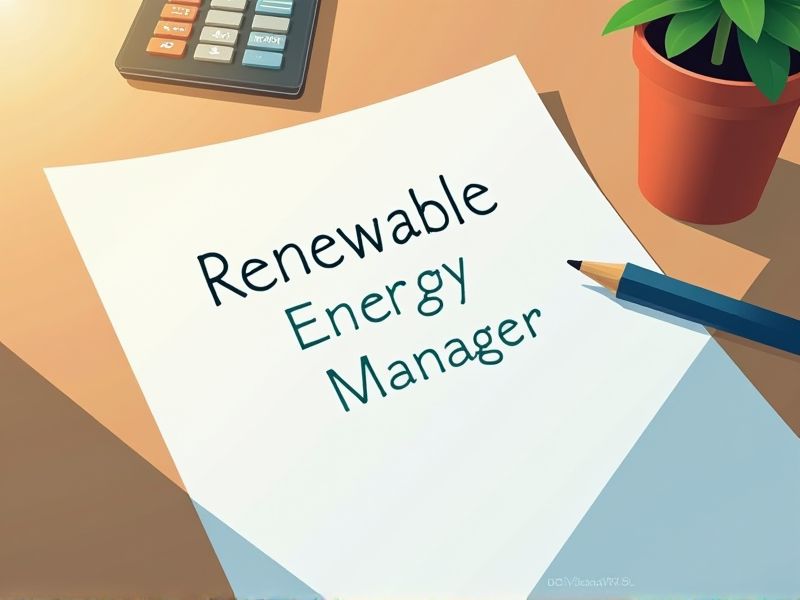
Renewable energy projects involve complex operations, requiring a comprehensive understanding of both technical and managerial elements. Certification ensures a consistent standard of knowledge and practice, enhancing project outcomes and efficiency. Employers often prefer certified professionals, as they bring verified skills that align with industry standards. Essential certifications for a Renewable Energy Project Manager include the following.
Project Management Professional (PMP)
A Project Management Professional (PMP) certification equips Renewable Energy Project Managers with standardized methodologies, enhancing project execution and minimizing risks. Its structured approach facilitates better resource allocation and scheduling, essential in the complex realm of renewable projects. The certification boosts credibility and trust among stakeholders, crucial for securing investments. The global nature of renewable projects benefits from the PMP's universal language and practices, fostering more effective international collaboration.
Certified Renewable Energy Professional (REP)
The complexity of renewable energy projects necessitates specific expertise, making a Certified Renewable Energy Professional (REP) vital for ensuring projects are executed efficiently. Certification fosters a deep understanding of regulatory requirements and industry standards, which directly impacts project compliance and sustainability. REP credentials signify proven knowledge and skills, enhancing the credibility and trust placed in the project manager by stakeholders. With renewables evolving rapidly, REP-certified project managers are equipped with up-to-date strategies for optimizing project performance and addressing emerging challenges.
Certified Energy Manager (CEM)
Certified Energy Managers possess specialized knowledge in energy system optimization, ensuring that renewable energy projects are designed and executed efficiently. Their expertise in energy audits and evaluating project economics enables project managers to make informed decisions on cost-saving measures and maximize return on investment. They help in identifying and implementing the best practices in energy conservation, which is crucial for meeting sustainability targets. Regulatory compliance and the ability to navigate energy policies further reinforce the importance of having a CEM involved in renewable energy projects.
LEED Accredited Professional (LEED AP)
A LEED Accredited Professional (LEED AP) is essential for a Renewable Energy Project Manager because they ensure that projects meet stringent green building standards, which can enhance a project's sustainability and efficiency. With a solid understanding of LEED requirements, the project manager can better integrate renewable energy solutions into the project framework, optimizing energy use. Having a LEED AP can also increase a project's appeal to environmentally conscious stakeholders looking to invest in green initiatives. LEED accreditation can lead to potential financial benefits like tax credits and incentives, aligning cost management with sustainability goals.
NABCEP Certified PV Installation Professional
Having a NABCEP Certified PV Installation Professional ensures that the Renewable Energy Project Manager is knowledgeable about industry standards and best practices. This certification demonstrates a verified level of expertise, which leads to improved project efficiency and safety. It instills client confidence by validating that the manager can oversee installations that will effectively meet energy production goals. The certification bridges knowledge gaps between technical installation tasks and project management strategies, ensuring well-rounded competency.
Certified Energy Auditor (CEA)
Certified Energy Auditors possess specialized skills that enable them to identify energy-saving opportunities in renewable energy projects, enhancing project efficiency. Their expertise in energy audits ensures accurate assessments of energy consumption, leading to more effective design and implementation of sustainable systems. By applying their knowledge on energy management, they can help reduce operational costs and improve the project's financial viability. CEAs contribute to regulatory compliance by ensuring that renewable energy projects meet industry standards and environmental policies.
Renewable Energy Project Management Certification (REPMC)
Renewable Energy Project Management Certification (REPMC) provides project managers with specialized knowledge required to navigate the complexities of renewable energy projects, ensuring they stay updated with the latest industry standards and technologies. By acquiring this certification, project managers demonstrate their expertise, making them more competitive in the job market, which continues to grow as the demand for renewable energy sources rises globally. The certification equips managers with strategies to efficiently plan, execute, and monitor projects while minimizing risks and optimizing resources. REPMC helps in promoting sustainable practices and adherence to regulatory requirements, crucial for project success and environmental compliance.
Energy Risk Professional (ERP)
An Energy Risk Professional (ERP) is needed to identify and mitigate financial risks associated with volatile energy markets, ensuring project stability. Regulatory compliance is crucial in renewable projects, and ERPs provide the expertise to navigate complex policies and standards. Their skills in forecasting energy prices help project managers make informed decisions about investments and pricing strategies. ERPs contribute to optimizing resource allocation and risk-adjusted returns, increasing project viability and long-term success.
Sustainable Energy Management Certification
A Sustainable Energy Management Certification equips a Renewable Energy Project Manager with advanced knowledge and skills, enabling them to effectively oversee complex projects. This certification ensures they are up-to-date with industry standards and regulations, which is crucial for compliance and efficient project execution. By understanding sustainable practices, project managers can implement strategies that reduce resource waste and enhance environmental benefits. The certification enhances the manager's credibility, increasing trust from stakeholders like investors and government bodies.
Certified Sustainability (CSR) Professional
A Certified Sustainability (CSR) Professional ensures renewable energy projects align with environmental and social governance standards, enhancing stakeholder trust. Their expertise in sustainable practices contributes to minimizing the environmental impact of projects, leading to more efficient resource management. With CSR skills, they can address regulatory requirements, reducing risks and potential operational disruptions. Their insights in sustainability reporting enhance transparency, key for attracting and retaining investors focused on long-term, responsible growth.
Summary
Earning certifications as a Renewable Energy Project Manager can significantly boost your career prospects by enhancing your expertise and credibility. With advanced credentials, you are likely to open doors to larger, more lucrative projects that demand proven competence. Organizations often recognize certified professionals for their commitment to continuous learning and quality. This acknowledgment can result in increased trust, leading to leadership roles and influence within project management circles.
